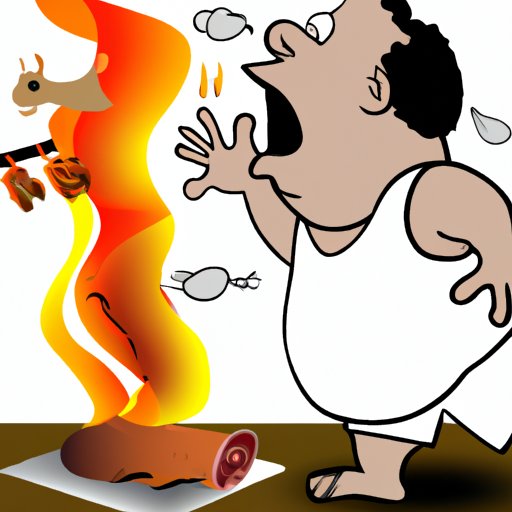Introduction
Barbecue (or BBQ) is a popular cooking method that involves cooking food over an open flame or hot coals. It’s a favorite summertime activity in many parts of the world, and it can be enjoyed in a variety of ways, from outdoor grilling to slow-cooking in a smoker. But is BBQ healthy? In this article, we’ll explore the potential health benefits and risks of barbecue, compare different types of BBQ, examine its nutritional content, and offer tips for enjoying BBQ in a healthy way.

Exploring the Health Benefits and Risks of Barbecue
When it comes to the health benefits of BBQ, there are some potential sources of vitamins and minerals found in barbecued foods. For example, grilled vegetables can provide valuable nutrients like vitamin A, vitamin C, and potassium. Additionally, according to a study published in the journal Nutrients, “barbecuing and grilling can increase the bioavailability of certain phytochemicals, such as lycopene and beta-carotene.”
However, there are also potential risks associated with BBQ. According to the American Institute for Cancer Research, when meat is cooked at high temperatures, “chemical reactions occur that form potentially cancer-causing compounds called heterocyclic amines (HCAs).” Additionally, polycyclic aromatic hydrocarbons (PAHs) can form when fat and juices from meat drip onto the heat source and cause smoke and flames. Both HCAs and PAHs have been linked to an increased risk of cancer, so it’s important to limit your exposure to them.
Comparing Different Types of BBQ: Which is Healthiest?
There are several different types of BBQ, including charcoal, gas, electric, and wood-fired. Each type has its own pros and cons when it comes to health. For example, charcoal BBQs tend to produce higher levels of HCAs and PAHs than other types of BBQ. On the other hand, gas BBQs are generally considered to be the healthiest option, since they produce fewer HCAs and PAHs. Electric BBQs and wood-fired BBQs are also relatively low in HCAs and PAHs, though they may produce more smoke than other types of BBQ.

Examining the Nutritional Content of Barbecue
The nutritional content of BBQ depends largely on the type of food being cooked. Generally speaking, meats cooked on the grill tend to be high in protein, fat, and calories. However, leaner cuts of meat are typically lower in fat and calories, making them a healthier option. Additionally, barbecued vegetables can provide valuable vitamins and minerals, such as vitamin A, vitamin C, and potassium.
How to Enjoy BBQ Without Sacrificing Your Health
If you want to enjoy the flavor of BBQ without sacrificing your health, there are a few things you can do. First, opt for leaner cuts of meat and trim off any visible fat before cooking. Second, avoid charring your food, as this can increase the formation of HCAs and PAHs. Third, use marinades to reduce the formation of HCAs and PAHs, and consider adding herbs and spices to your food for additional flavor. Finally, make sure to include plenty of vegetables on your grill, as these can provide valuable vitamins and minerals.

The Dangers of Eating Too Much BBQ
Eating too much BBQ can lead to a variety of health issues, such as weight gain, increased cholesterol levels, and digestive problems. Additionally, eating large amounts of processed and cured meats, such as bacon and sausage, can increase your risk of developing certain types of cancer. To avoid these risks, it’s important to limit your consumption of BBQ and focus on healthier options.
Is Barbecue a Healthy Option for Kids?
For children, BBQ can be a healthy option in moderation. The American Academy of Pediatrics recommends limiting children’s intake of processed and cured meats, such as bacon and sausage. Additionally, the AAP recommends that children consume plenty of fruits and vegetables along with their BBQ meals. If possible, opt for leaner cuts of meat, such as chicken and fish, and try to avoid charring the food.
Conclusion
In conclusion, BBQ can be a healthy option in moderation. When choosing a type of BBQ, opt for gas or electric, as these tend to produce fewer HCAs and PAHs. Additionally, focus on leaner cuts of meat and include plenty of vegetables. Finally, limit your intake of processed and cured meats, as these can increase your risk of certain types of cancer. With careful consideration and moderation, you can enjoy BBQ without sacrificing your health.
(Note: Is this article not meeting your expectations? Do you have knowledge or insights to share? Unlock new opportunities and expand your reach by joining our authors team. Click Registration to join us and share your expertise with our readers.)
